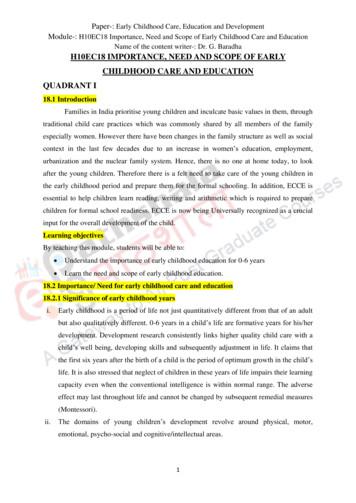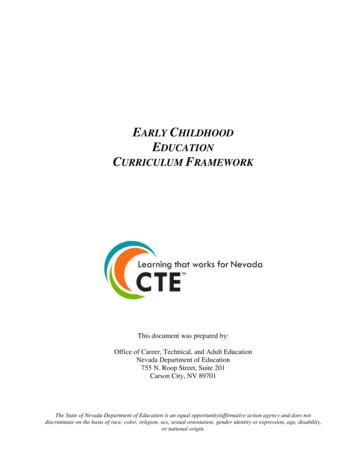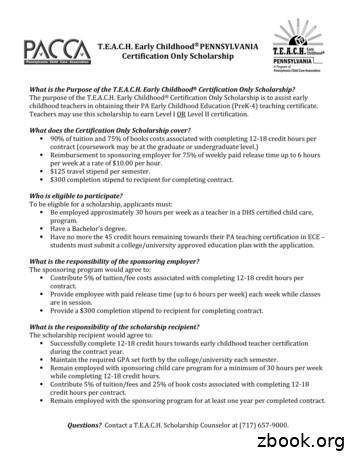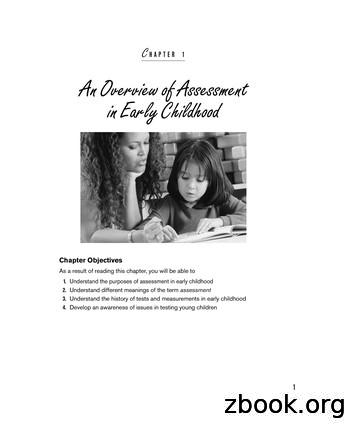EARLY CHILDHOOD TEACHER EDUCATION - Colorado
STATEWIDE TRANSFER ARTICULATION AGREEMENTinEARLY CHILDHOOD TEACHER EDUCATIONFor an Associate Degree with Designation (DwD)FROM ONE OF THESE COLORADO PUBLIC COMMUNITY / JUNIOR COLLEGESAims Community College [A.A. Early Childhood Education]Arapahoe Community College [A.A. Early Childhood Teacher Education]Colorado Mountain College [A.A. Early Childhood Teacher Education]Colorado Northwestern Community College [A.A. Early Childhood Education]Community College of Aurora [A.A. Early Childhood Education]Community College of Denver [A.A. Early Childhood Teacher Education]Front Range Community College [A.A. Early Childhood Teacher Education]Lamar Community College [A.A. Early Childhood Education]Morgan Community College [A.A. Early Childhood Teacher Education]Northeastern Junior College [A.A. Early Childhood Education]Otero Junior College [A.A. Early Childhood Education]Pikes Peak Community College [A.A. Early Childhood Education]Pueblo Community College [A.A. Early Childhood Education]Red Rocks Community College [A.A. Early Childhood Education]Trinidad State Junior College [A.A. Early Childhood Teacher Education]andFor a Bachelor’s DegreeFROM ONE OF THESE COLORADO PUBLIC FOUR-YEAR INSTITUTIONSAdams State University [B.A. Early Childhood Education]Colorado Mesa University [B.A. Early Childhood Education - Early Childhood Special Education]1Colorado State University-Fort Collins [B.S. Early Childhood Education]Colorado State University-Pueblo [B.S. Early Childhood Education]Fort Lewis College [B.A. Early Childhood Education]Metropolitan State University of Denver [B.A. Early Childhood Education]University of Colorado Denver [B.A. Education and Human Development – Early Childhood]University of Northern Colorado [B.A. Early Childhood Teacher Education (Birth – Grade 3)]1Colorado Mesa University also accepts the AA Liberal Arts with Early Childhood Education emphasis from Western ColoradoCommunity College.1600 Broadway, Suite 2200, Denver, CO 80202 P 303.862.3001 F 303.996.1329 highered.colorado.gov
INTRODUCTIONA statewide transfer articulation agreement identifies the community college courses studentsneed to take in order to graduate from a community college with a 60-credit Associate of Arts(AA) or Associate of Science (AS) degree with designation (DwD). Students are responsible forinforming the admissions counselor or intake advisor at their receiving four-year institution thatthey are completing a DwD.It is important for students to understand that completion of an AA or AS degree within twoyears requires them to complete an average of 15 credits per semester (or 30 credits per year).Also, research shows that students who take classes in their major area within their first 30credit hours are more likely to persist and graduate.The guarantees and limitations below describe the minimum requirements to which allparticipating institutions have agreed. Students who believe an institution is not meeting theguarantees described below can file a complaint s/ .PART ONE: GUARANTEESStudents who complete a DwD pursuant to the prescribed curriculum in this statewide transferarticulation agreement and pass all 60 credits with a C- or higher and are admitted to thereceiving institution’s corresponding degree program (see cover page) are guaranteed thefollowing:1. Junior standing with no more than 66 remaining credits to meet the graduationrequirements for the baccalaureate degree program covered by this articulationagreement (see cover page).2. Completion of the receiving institution’s lower division general education requirements asdefined by the GT Pathways curriculum.3. The same graduation requirements as students who begin and complete this degreeprogram at the four-year institution.4. Beginning fall 2019, admission to all Colorado public baccalaureate awarding institutions(except Colorado School of Mines) will be guaranteed to applicants who have completedany AA or AS degree from a Colorado public two-year institution after high schoolgraduation, provided certain requirements are met. To see these requirements, pleaserefer to the Colorado Commission on Higher Education’s Admissions Standards Policy(effective for students seeking admission for fall 2019 and after), Section titled“Guaranteed Transfer Admissions” ies/Current/i-partf-fall-2019.pdf. Pleasenote: Students transferring to a University of Colorado institution (Boulder, ColoradoSprings, Denver) must satisfy the CU System’s MAPS (Minimum Academic PreparationStandards) requirement.Statewide Transfer Articulation AgreementRevised: December 2018Early Childhood Teacher EducationPage 2 of 10
5. Per the Commission’s Prior Learning Assessment policy, section 2.07 icies/Current/i-partx.pdf), and pursuant toColorado Revised Statutes §23-1-108 (7)(b)(II)(A), “a state institution of higher educationthat admits as a junior a student who holds an associate of arts degree, associate ofapplied science degree, or associate of science degree that is the subject of a statewidedegree transfer agreement shall not require the student to complete any additionalcourses to fulfill general education requirements”, and that the receiving institution ofhigher education is responsible for the total cost of tuition “for any credit hours thatexceed the total credit hours required for a native student or that extend the total time toreceive the degree beyond that required for a native student”.6. The Commission’s Prior Learning Assessment policy also states “every Colorado publicinstitution of higher education shall accept in transfer from within the institution and fromother state institutions of higher education prior learning assessment credit awarded forGT Pathways requirements” (section 3.01), and “Colorado public institutions of highereducation shall not prohibit students from meeting general education/GT Pathwaysrequirements with prior learning assessment credit“ (section 3.02).PART TWO: LIMITATIONS1. Until the Commission’s new Admissions Policy takes effect fall 2019, completion of theprescribed curriculum in this statewide transfer articulation agreement does notguarantee admission to a participating receiving institution. Students must meet alladmission and application requirements at the receiving institution including thesubmission of all required documentation by stated deadlines.2. Only courses with grades of C- or higher are guaranteed to transfer.3. Admission to a receiving institution does not guarantee enrollment in a specific degreeprogram. Some programs at receiving institutions have controlled entry due either tospace limitations or academic requirements.4. The credit and course transfer guarantees described in this agreement apply to thespecific degree programs covered by this agreement (see cover page). If the studentchanges majors, receiving institutions will evaluate application of the courses designatedin this agreement to other degree programs on a course-by-course basis.5. Students are allowed to use credits awarded by exam, such as AP (AdvancedPlacement) and IB (International Baccalaureate), as long as those exams are listed onthe exam tables here: GetCredit.html,or may use challenge exams to fulfill GT Pathways requirements (not necessarily majorrequirements) and those credits are guaranteed to transfer and apply to GT Pathwaysrequirements at the receiving institution per the Colorado Commission on HigherStatewide Transfer Articulation AgreementRevised: December 2018Early Childhood Teacher EducationPage 3 of 10
Education’s Policy I, X: Prior Learning Assessment. See the entire policy for moreinformation: s/Current/i-partx.pdf.6. The receiving institution shall accept all applicable credits earned within ten years oftransfer to the receiving institution. Credits earned more than ten years earlier will beevaluated on a course-by-course basis.7. All the courses a student needs to take in the associate degree program covered by thisstatewide transfer articulation agreement are listed in the prescribed curriculum. Coursesubstitutions are allowed as long as the student and sending and receiving institutionsagree to the substitution; such agreement should be documented in writing and thestudent should keep a copy until the baccalaureate degree is conferred. Note that ifstudents substitute a course, then this is no longer a statewide agreement and some ofthe guarantees are only for the receiving institution that agreed to the substitution. Anyadditional courses taken in the discipline covered by this agreement might notcount toward the requirements of the major at the receiving institution. Studentscan avoid this problem by either taking no more courses in the discipline than the onesidentified in the prescribed curriculum or by consulting first with the receiving institution toassure that any additional courses they take in the discipline will count toward the major.Because of the limitations above, students must consult with the Office of Admissions at theinstitution to which they are transferring.Statewide Transfer Articulation AgreementRevised: December 2018Early Childhood Teacher EducationPage 4 of 10
PART THREE: PRESCRIBED CURRICULUMCourses that Fulfill General Education RequirementsCreditHours(Written) CommunicationEnglish Composition I (GT-CO1) andENG 122English Composition II (GT-CO2)4MAT 120Mathematics for the Liberal Arts (GT-MA1)6MUS 120 orART 110 orTHE 105andLIT 115 orLIT 255Music Appreciation (GT-AH1) orArt Appreciation (GT-AH1) orTheater Appreciation (GT-AH1)andIntroduction to Literature (GT-AH2) orChildren’s Literature (not GT Pathways)3HIS 121 orHIS 122U.S. History to Reconstruction (GT-HI1) orUS History since Civil War (GT-HI1)6GEO 105 andPSY 101World Regional Geography (GT-SS2) andGeneral Psychology (GT-SS3)8SCI 155 andIntegrated Science I w/Lab (GT-SC1) andSCI 1562Integrated Science II w/Lab (GT-SC1)Arts & Humanities(choose two courses)HistorySocial & BehavioralSciencesNatural & PhysicalSciencesCourse Title or CategoryENG 121 and6MathematicsCommunity CollegeCourse No.33 creditsAdditional Required Courses18 creditsPlease note: if these credits are not required for the major at a receiving 4-year institution, they will be applied to theBachelor’s degree as elective credit towards graduation. Please check with the receiving institution to determine inwhich way these courses will be applied.CreditHoursCommunity CollegeCourse No.Course Title3ECE 101Intro to Early Childhood Ed3ECE 102Intro to ECE Lab Techniques3ECE 103Guidance Strategies for Young Children3ECE 220Curriculum Methods and Techniques3ECE 238Child Growth and Development3ECE 256Working with Parents,, Families and CommunitiesElectives: Nine credits determined by the receiving 4-year institution. See below.Total2960Students must pass with a C- or higher BOTH SCI 155 & 156 to satisfy the GT Pathways science requirement.Statewide Transfer Articulation AgreementRevised: December 2018Early Childhood Teacher EducationPage 5 of 10
Qualifying Courses that Satisfy Nine (9) ELECTIVE Credit HoursBY INSTITUTIONAdams State UniversityB.A. Early Childhood Education with Licensure or Non-LicensureAdvisor: Chrissy McKinneycmckinney@adams.edu 719 587-7503 orteachered@adams.edu 719 587-7776Colorado Community College System Courses:ECE 111 – Infant and Toddler Theory and PracticeECE 112 – Intro to Infant /Toddler Lab TechniquesAnd choose one (1) of the following:ECE 240 – Administration of Early Childhood Care and Education Programs (3)ECE 241 – Administration: Human Relations for Early Childhood Education (3)Colorado Mesa UniversityB.A. Early Childhood Education - Early Childhood Special EducationAdvisor: Vail 4Colorado Community College System Courses:Choose three (3) of the following:ECE 111 – Infant and Toddler Theory and Practice (3)ECE 205 – Nutrition, Health and Safety (3)ECE 240 – Administration of Early Childhood Care and Education Programs (3)ECE 241 – Administration: Human Relations for Early Childhood Education (3)ECE 260 – The Exceptional Child (3)Colorado State University – Fort CollinsB.S. Early Childhood Education with LicensureB.S. in Human Development and Family Studies, Early Childhood Professions Concentration – NonLicensureAdvisor (for pre-admissions questions): Cerissa Stevenson (CEP) and Katie Ditter (HDFS)cerissa.stevenson@colostate.edu 970-491-0922katie.ditter@colostate.edu 970-491-7423Colorado Community College System Courses:MAT 135 – Intro to Statistics (3) GT-MA1PSY 235 – Human Growth & Development (3) GT-SS3ECE 205 – ECE Nutrition, Health, and Safety (3)Statewide Transfer Articulation AgreementRevised: December 2018Early Childhood Teacher EducationPage 6 of 10
Colorado State University – PuebloB.S. Early Childhood Education with K-3 Licensure or Non-LicensureAdvisor: Jeff Piquettejeff.piquette@csupueblo.edu 719-549-2681Colorado Community College System Courses:ECE 111 – Infant and Toddler Theory and Practice (3)ECE 241 – Administration: Human Relations for Early Childhood Education (3)ECE 205 – ECE Nutrition, Health, and Safety (3)Fort Lewis CollegeB.A. Early Childhood Education with LicensureAdvisor: Kris Greergreer k@fortlewis.edu 970-247-7633PSY 235 – Human Growth & Development (3) GT-SS3ECE 228 – Language and Literacy (3)ECE 241 – Administration: Human Relations for Early Childhood Education (3)Metropolitan State University of DenverB.A. Early Childhood Education with Licensure or Non-LicensureAdvisor: Amber Paughapaugh@msudenver.edu 303-556-3622Colorado Community College System Courses:COM 115 – Public Speaking (3)PSY 102 – General Psychology II (3) GT-SS3ECE 111 – Infant and Toddler Theory and Practice (3)University of Colorado DenverB.A. Education and Human Development – Early Childhood Education Trackwith Licensure or Non-LicensureAdvisors: Miriam Cummings miriam.cummings@ucdenver.eduRosalinda Martinez rosalinda.martinez@ucdenver.eduPhone: 303-315-6300Colorado Community College System CoursesECE 205 – ECE Nutrition/Health/Safety (3)ECE 240 – Administration of Early Childhood Care and Education Programs (3)And please choose one (1) of the following:ECE 226 – Creativity and the Young Child (3)ECE 241 – Administration: Human Relations for Early Childhood Education (3)Statewide Transfer Articulation AgreementRevised: December 2018Early Childhood Teacher EducationPage 7 of 10
University of Northern ColoradoB.A. Early Childhood Education with Licensure or Non-LicensureAdvisor: Kathy O’NeilKathleen.oneil@unco.edu 970-351-2070University of Northern Colorado – Center for Urban Education, DenverB.A. Early Childhood Education with Licensure or Non-LicensureAdvisor: Amanda Rutteramanda.rutter@unco.edu 303-637-3070Colorado Community College System CoursesECE 111 – Infant and Toddler Theory and Practice (3)ECE 240 – Administration of Early Childhood Care and Education Programs (3)ECE 241 – Administration: Human Relations for Early Childhood Education (3)Statewide Transfer Articulation AgreementRevised: December 2018Early Childhood Teacher EducationPage 8 of 10
Addendum to AgreementStudents who do not complete an AA/AS degree can use the prescribed curriculum within astatewide articulation agreement as a common advising guide for transfer to all publicinstitutions that offer the designated baccalaureate degree program.Please note the following:1. The guarantee that the number of credits required to graduate will be at the Statemandated minimum for this baccalaureate degree program applies only to students whocomplete the AA/AS degree and the complete curriculum prescribed in this agreement.2. Students are guaranteed application of completed GT Pathways courses within thecurriculum prescribed in this agreement up to the established maximum in each category.3. Except in special cases (e.g., the partial completion of a required sequence of courses orvariation in the number of credit hours institutions award for course equivalents), studentscan expect that courses specified within the prescribed curriculum in this agreement thatare successfully completed with a C- or higher will fulfill the relevant course requirementsin the designated major.4. Receiving institutions will evaluate all courses other than those specified in thisagreement on a course-by-course basis.Students transferring without a completed AA/AS degree must consult with the Office ofAdmissions at the institution to which they are considering transferring to review the issuesidentified above and to make sure they meet all admission and application requirements at thereceiving institution, including the submission of all required documentation by stated deadlines.This agreement will remain in force until such time as it is formally modified or terminated.Signatures on file at the Colorado Department of Higher ORY OF REVISIONS TO AGREEMENT: 2015-08-07– Approved by CCHE. 2016-08 – Cover page revised: added only CCs who are participating and degree titles; some formattingadjustments. 2016-12 – Formatting edits made. 2017-01 – Revised MSU Denver’s qualifying courses for elective credit; revised cover page formatting. 2017-01-11 – Added Lamar Community College to the cover page. 2017-03 Revisions made to Introduction, Guarantees, and Limitation sections. 2017-05 MSUD course updates. 2017-09 UCD course updates (electives). 2017-12 Additional Required Courses and 9 Elective Credit Hours revised. CMU added to agreement.Statewide Transfer Articulation AgreementRevised: December 2018Early Childhood Teacher EducationPage 9 of 10
2018-08 UCD advisor/contact updates.2018-10 CSU-Pueblo added to agreement. Change in CMU elective requirements.2018-12 – Revisions made to Introduction and Limitations sections. Paragraphs 5 & 6 added to Guaranteessection to reflect changes made to CCHE Prior Learning Assessment policy. Updated advisor contact for ASU.APPROVED BY COLORADO STATE UNIVERSITY – PUEBLOPresident/ChancellorDateChief Academic OfficerDateStatewide Transfer Articulation AgreementRevised: December 2018Early Childhood Teacher EducationPage 10 of 10
ECE 240 - Administration of Early Childhood Care and Education Programs (3) ECE 241 - Administration: Human Relations for Early Childhood Education (3) Colorado Mesa University B.A. Early Childhood Education - Early Childhood Special Education Advisor: Vail Shoultz-McCole vshoultz@coloradomesa.edu 970-255-2674
Understand the importance of early childhood education for 0-6 years Learn the need and scope of early childhood education. 18.2 Importance/ Need for early childhood care and education 18.2.1 Significance of early childhood years i. Early childhood is a period of life not just quantitatively different from that of an adult
The Early Childhood Leadership Commission (ECLC) is pleased to endorse Colorado's Early Childhood Workforce 2020 Plan. Ensuring a high-quality, effective, and diverse early childhood workforce is a critical component in meeting our shared . Early childhood educators are significant contributors to children's healthy development; a myriad .
Early Childhood Education I L1 Early Childhood Education II L2 Early Childhood Education III L3C Early Childhood Education Advanced Studies AS The core course sequencing with the complementary courses provided in the following table serves as a guide to schools for their programs of study.
Early Childhood Care, Development and Education (ECCDE) is a term that is used interchangeably worldwide but refers to the same concept of early childhood education and cognitive development. The World Bank for instance refers to it as Early Childhood Care and Education, whereas UNESCO refers to it as Early Childhood Development Care.
T.E.A.C.H. Early Childhoodâ PENNSYLVANIA Certification Only Scholarship What is the Purpose of the T.E.A.C.H. Early Childhood Certification Only Scholarship? The purpose of the T.E.A.C.H. Early Childhood Certification Only Scholarship is to assist early childhood teachers in obtaining their PA Early Childhood Education (PreK-4) teaching certificate.
Center-Based and Family Child Care Early Childhood Education Reviewer The Early Childhood Education (ECE) Reviewer must meet one of the following sets of education and experience options: Education and Experience Option I 1. B.A., B.S., or advanced degree in early childhood education/child development or home
CHAPTER 1 An Overview of Assessment in Early Childhood Understanding Assessment in Infancy and Early Childhood Not too long ago, resources on early childhood assessment were limited to occa-sional articles in journals, chapters in textbooks on teaching in early childhood pro-grams, and a few small textbooks that were used as secondary texts in .
2 CHAPTER1. INTRODUCTION 1.1.3 Differences between financial ac-countancy and management ac-counting Management accounting information differs from























